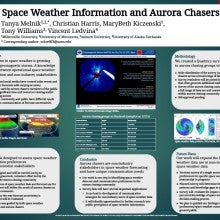Space Weather Information and Aurora Chasers
Tanya
Melnik
Millersville University
Poster
General public interest in space weather has increased due to recent significant geomagnetic storms with spectacular northern and southern lights. This trend is reflected in mass and social media coverage of solar events and auroral forecasts, with platforms like Twitter tracking activity for over a decade. However, publications in the media often rely on official forecasts without input from scientific or operational space weather experts. As a result, forecasts designed for industries affected by severe space weather are frequently shared without explanation of their limitations and uncertainties to the general public. This can lead to public disappointment when forecasts do not materialize as predicted, potentially eroding trust in science. While the scientific community is active in social media and space weather communication, little is known about how forecasts are used by aurora chasers and other space weather enthusiasts.
Our team, composed of interdisciplinary academics, citizen scientists, and amateur aurora chasers, is focused on improving the communication of space weather forecasts. To achieve this, we will conduct a targeted survey to explore how aurora chasers use forecasts to plan activities. The survey will capture community views on forecast uncertainty, such as acceptable timing and geomagnetic impact, examine where aurora chasers seek out data sources, and investigate how they apply this information in decision-making. These insights will guide the development of tailored communication strategies for aurora chasers and related non-industry users, while also identifying opportunities for further research into public perceptions of space weather information.
Our team, composed of interdisciplinary academics, citizen scientists, and amateur aurora chasers, is focused on improving the communication of space weather forecasts. To achieve this, we will conduct a targeted survey to explore how aurora chasers use forecasts to plan activities. The survey will capture community views on forecast uncertainty, such as acceptable timing and geomagnetic impact, examine where aurora chasers seek out data sources, and investigate how they apply this information in decision-making. These insights will guide the development of tailored communication strategies for aurora chasers and related non-industry users, while also identifying opportunities for further research into public perceptions of space weather information.

Poster PDF
Poster category
Space Weather Policy and General Space Weather Contributions
Meeting homepage